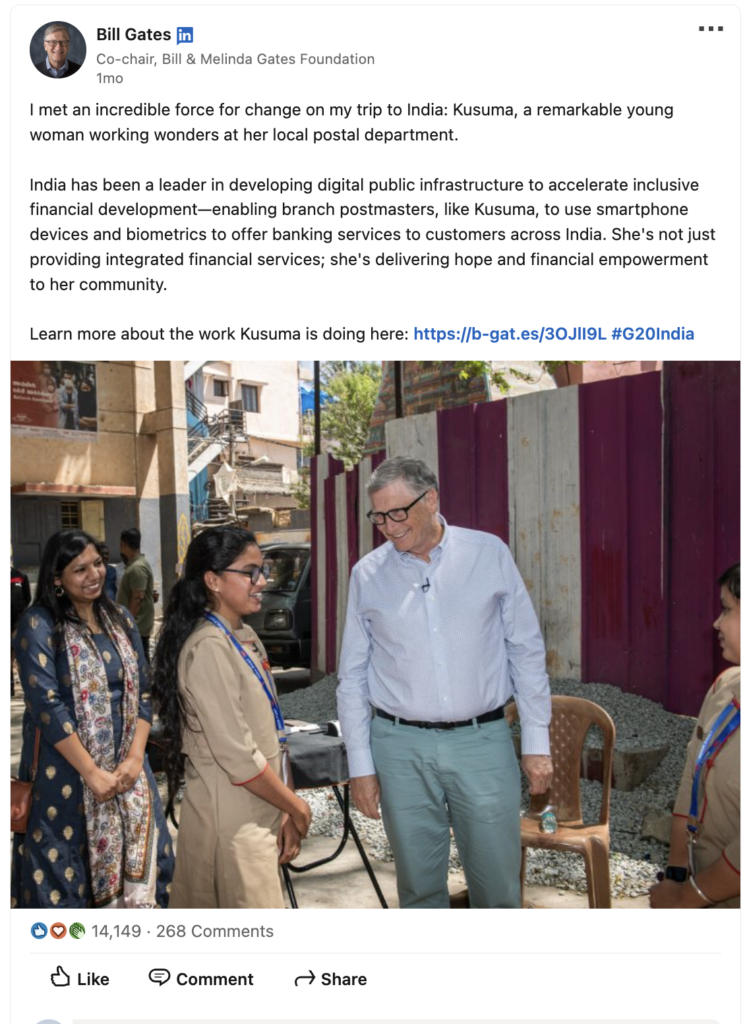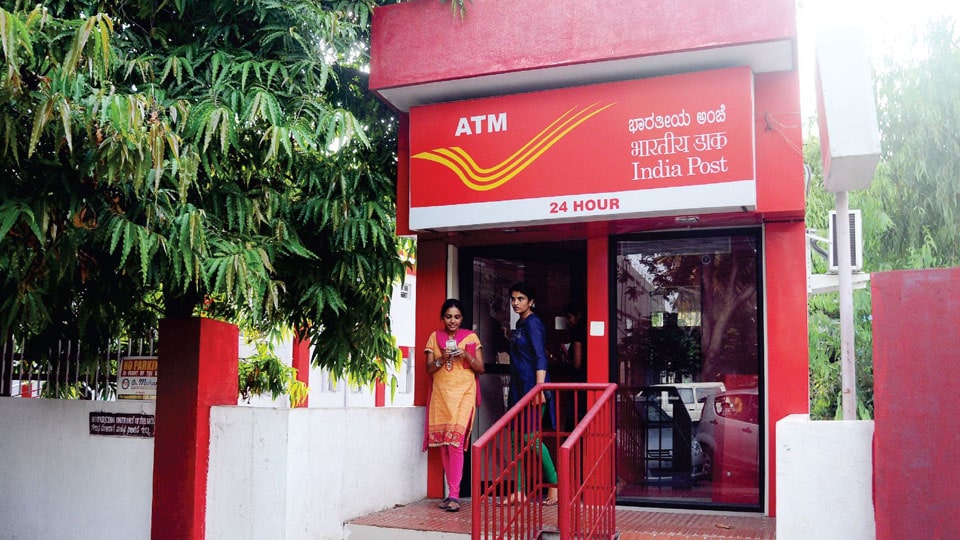Sep 4, 2018: India Post Payments Bank Replaces ATM/Debit Cards With QR Cards: Here’s A Detail About It

PM Narendra Modi launched the Indian Post Payments Bank (IPPB). It does away with ATM cards and debit cards for both cash and cashless transactions. IPPB will issue new Quick Response (QR) cards which will work on biometric authentication and not on pins and passwords, as it happens now.

Related Article:

August 23, 2023: Bill Gates Can’t Stop Praising ThisYoung Bengaluru Woman; Here’s Why
The India Post Payments Bank card that helps to access digital banking in India
In the video, a branch postmaster in Bangalore named Kusuma K. explains the impact of digital banking in her community and her pride in playing this important role.
‘She’s Delivering Hope’

On his recent India trip, Bill Gates met with the who’s who of Indian industrialists, Bollywood stars, policymakers, and activists. The techpreneur also visited some of the lesser known parts of India and met with changemakers, whom few know about. Gates wrote about one such changemaker in a recent social media post. He introduces Kusuma K., a Branch Postmaster for India Post Payments Bank in Bangalore. Gates calls Kusuma an incredible force for change and a remarkable young woman.
Gates explains how the 22 year old Kusuma has been a pivotal part of India’s digital public infrastructure that is accelerating financial development. It has enabled changemakers like Kusuma to deliver beyond integrated financial services. She’s delivering hope and financial empowerment to the community, quips the billionaire philanthropist. Kusuma is a branch postmaster in Huskur Branch Office in India’s Silicon Valley.

Gates explains how the India Post Payments Bank helps 70 million people with cash withdrawals, remittances, and utility payments. In the video shared at the Gates Foundation, Kusuma explains that most of the people who throng the doors of the post office come to avail themselves of their pensions. About 300 people visit every month. Few would ask about saving the amount rather than withdrawing it all at once. The direct interaction with people has bolstered Kusuma’s confidence, and she loves communicating with them. Kusuma remarks that her post as a branch manager is inspirational to other girls and women in the community.

A story of digital banking in India—and a young woman’s promising career path
Related Article:
Bill Gates: Digital Public Infrastructure important for countries facing crises like climate disasters, pandemics, and other emergenciesCLICK HERE When the COVID-19 pandemic struck, governments around the world rushed to send emergency payments to their people as lockdowns ground their economies to a halt. Some countries dispensed funds to millions of people within weeks. Others took months, sent money to the wrong people, or excluded qualified recipients. How quickly people received money depended largely on whether they lived in a country with a strong digital public infrastructure, or DPI. DPI can be a game changer for any country, but especially low- and middle-income countries, where it can help accelerate economic growth by an estimated 20% to 33%. Our foundation funds projects to advance DPI because it creates opportunities that help people thrive—across sectors such as health care, agriculture, and financial inclusion—while enabling women’s economic power. ( https://www.gatesfoundation.org/ideas/articles/womens-health-economic-power ) Here’s what you need to know about DPI and why it’s important. DPI is a digital network that enables countries to safely and efficiently deliver economic opportunities and social services to all residents. DPI can be compared to roads, which form a physical network that connects people and provides access to a huge range of goods and services. DPI allows people to open bank accounts and receive wages faster and more easily. It allows governments to support citizens more quickly and efficiently, especially during emergencies. And it enables entrepreneurs to reach customers far and wide. A strong DPI has three foundational systems—identity, payments, and data exchange—that together can make life easier in important ways. When the three core systems—identity, payments, and data exchange—exist simultaneously and can talk to one another, people, businesses, and governments can reap the full benefits of DPI. Over time, safe and inclusive DPI creates vibrant and competitive economies. There is no set way to build DPI, but countries that start with a comprehensive strategy to build interoperable identity, payment, and data exchange systems will have greater success. And fortunately, countries don’t have to start from scratch. They can draw on proven digital public goods—affordable, flexible, open-source technologies that serve as building blocks—to build their systems and ensure that they meet the needs of their economies and people. Our foundation funds two digital public goods that can help countries build DPI: Related Article: What is MOSIP’s role in digital public infrastructure? Gates Foundation explains ( https://mojaloop.io/) During a crisis such as the COVID-19 pandemic, countries with DPI can speedily and securely help their citizens by delivering emergency payments to those who need them most. For example, within weeks of the initial pandemic lockdown, India digitally transferred emergency payments to 300 million people, including 200 million low-income women. Even countries with partial DPI systems were able to meet their people’s needs much more effectively during the pandemic. Togo used its election registry and digital payment channels to expand social assistance coverage from 12,000 to 1.8 million, reaching 35% of adults with emergency funds. In countries without DPI, pandemic relief payments were delayed, were sent to the same people multiple times, or didn’t reach the right people. These challenges raised awareness of the benefits of DPI and prompted some countries to quickly begin adopting DPI systems. This was true in the Philippines, which struggled to disburse financial assistance quickly and accurately, leading the country to adopt the MOSIP digital identity system. DPI can advance many of the Sustainable Development Goals, the 17 global goals for 2030 adopted by all United Nations member states. ( https://sdgs.un.org/goals ) Source: Star of Mysore, The Live Mirror, Mashable India, Twitter, Gates Foundation, Also Read:What is digital public infrastructure?
What is digital public infrastructure (DPI)?
What makes for a strong DPI?
How does DPI affect a country’s economy?
Do countries need to build DPI from scratch?
Why is DPI important for countries facing crises like climate disasters, pandemics, and other emergencies?
Can DPI help us reach the Sustainable Development Goals?
